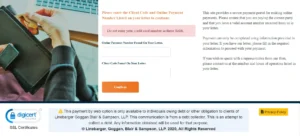Hey there! Have you ever seen a missed call on your phone from a number starting with +63? Did you think about calling it back to find out who it was? Hold on! That could be a sneaky trick called the 63 Country Code Scam.
Scammers use the +63 code, which comes from the Philippines, to fool people. If you call back, you might lose money or have your personal stuff stolen!
In this blog post, we’ll tell you all about this scam, how it works, and how to stay safe. Keep reading to become a scam-busting hero!
Key Takeaways
Here’s a quick list of the most important things you’ll learn about the 63 Country Code Scam. These points will help you stay safe and smart!
- The +63 country code belongs to the Philippines.
- Scammers use +63 numbers to make missed calls or send texts.
- Calling back can cost you a lot of money or lead to tricks that steal your info.
- Do not call back unknown numbers from other countries.
- Block any weird numbers and tell someone about the scam.
- Keep your personal information safe from strangers.
- Scammers want you to be curious so you call them back.
- You can report scams to your phone company or grown-ups in charge.
- Learning about scams helps you avoid them.
- Stay safe by being careful with unknown calls and texts.
This list is just the start! We’ll dive deeper into each part so you can understand everything about this scam and how to beat it.
What is the 63 Country Code Scam?
The 63 Country Code Scam is a sneaky plan by bad people to take your money or information. They use phone numbers that start with +63, the code for the Philippines. These scammers call you or send a text and then stop fast. You see a missed call or message and might want to call back. If you do, you might connect to a special number that charges you tons of cash for every minute!
Sometimes, they try to trick you into giving them secrets like your bank info or passwords. This can lead to something called identity theft. That’s when someone pretends to be you and does bad stuff, like taking money from your piggy bank.
Be super careful with strange numbers, especially ones with +63. Don’t call back unless you know someone in the Philippines who might be calling. Knowing about this scam keeps you and your family safe!
How Does the 63 Country Code Scam Work?
This scam is simple but tricky! Scammers use computers to call lots of people at once. They let your phone ring one or two times and then hang up. You’ll see a missed call. Or they might send a text saying, “You won something!” or “Your package is waiting!”
When you call back, you reach a special number that costs a lot of money. These are called premium-rate numbers. The scammers get paid the longer you stay on the call. They might play a message like, “Wait here,” to keep you listening.
Some scammers also ask for your personal info. They might pretend to be from your bank or a store you like. Never tell strangers your secrets over the phone. That’s how they trick you!
Examples of the 63 Country Code Scam
Want to see how this scam looks? Here are some examples!
Imagine you get a missed call from +63 912 345 6789. You don’t know anyone in the Philippines, but you call back. A voice says, “Hold on for a big surprise!” While you wait, your phone bill goes up fast.
Or you get a text from +63 987 654 3210 saying, “You won a trip! Call now!” If you call, they might ask for your address or money for the “prize.” There’s no trip—it’s a lie!
Another text might say, “Your package is stuck. Click here!” The link goes to a fake page that steals your info. These tricks are sneaky, so watch out for them!
Why Do Scammers Use the +63 Country Code?
Scammers pick the +63 code for smart reasons. The Philippines is far away from many places, so you might not know the code. You could think it’s a normal call.
The Philippines has lots of people and phones, so scammers can get numbers easily. Some places there don’t have tough rules about scams. That makes it simple for bad guys to work.
Calls to other countries cost more, and scammers cash in on that. They use +63 to hide where they really are. They could be anywhere, not just the Philippines!
Knowing why they use +63 helps you spot their tricks better.
How to Identify a 63 Country Code Scam Call or Text
Spotting this scam is easy if you know what to look for. Check out these signs!
If a +63 number calls or texts and you don’t know anyone in the Philippines, be careful. Scammers love unknown numbers. A missed call with no message is a big clue too.
Watch for texts that sound exciting, like “You won!” or “Act fast!” Those are traps. If they ask for your info, like your birthday or bank stuff, it’s a scam.
Links in texts are risky too. They might take you to fake websites. Don’t click or call back—just block them!
What to Do If You Receive a Missed Call from +63
Got a missed call from +63? Here’s what to do!
Don’t call back right away. Think first—do you know someone in the Philippines? If not, it’s likely a scam.
Look up the number online. Other people might say it’s a scam too. Then block it on your phone so they can’t call again.
Tell your phone company or a grown-up about it. They can help stop the scammers. Stay smart and safe!
How to Avoid Falling Victim to the 63 Country Code Scam
Staying safe from this scam is simple with these tips!
Be picky about unknown calls or texts. If it’s from +63 and you don’t know it, skip it. Don’t call back unless you’re sure it’s real.
Block international calls on your phone if you can. Learn about scams so you know their tricks. Keep your info secret from strangers.
Scams change, so keep learning new ways to stay safe. You’ve got this!
Reporting the 63 Country Code Scam
Telling someone about the scam helps stop it! Here’s how!
Call your phone company and say you got a weird +63 call. They might block it. In the USA, tell the FTC at ftc.gov/complaint.
Share it online at places like the Better Business Bureau. Warn your friends and family too. Reporting is power against scammers!
The Impact of the 63 Country Code Scam
This scam can hurt people in big ways. Check this out!
You might lose money from big phone bills or giving cash to scammers. They could steal your identity and use it to buy stuff.
It feels bad to get tricked. You might feel sad or mad. Fixing it takes time, like calling your bank.
That’s why staying safe matters so much!
Protecting Your Personal Information
Keeping your info safe stops scammers. Try these ideas!
Don’t share secrets online or with strangers. Use hard passwords for your stuff. Ask who’s calling before you tell them anything.
Look at your bank stuff often to spot weird things. Use apps to keep your phone safe. You’re the boss of your info!
The Role of Telecom Companies in Preventing Scams
Phone companies can fight scams too! Here’s how!
They can block bad numbers so you don’t get calls. They teach people about scams with tips. They fix their systems to catch tricks.
They team up with grown-ups in charge to stop scammers. Phone companies are helpers!
Government Efforts to Combat Telecom Scams
Governments help stop scams too! Look at this!
They make rules to catch scammers. They tell everyone how to stay safe. They work with other countries to stop big scams.
They help people who got tricked. Governments are on our side!
The Future of Telecom Scams and Prevention
Scams won’t stop, but we’re getting smarter! Here’s the future!
New tech can spot and block scam calls. More people will learn how to stay safe. Rules will get tougher on scammers.
Countries will work together to win. We’re building a safer phone world!
FAQs about the 63 Country Code Scam
What is the +63 country code?
The +63 code is for the Philippines. It’s where phone numbers there start.
Why do scammers use the +63 code?
They use it to make money from calls or steal your info. It’s sneaky!
What should I do if I get a missed call from +63?
Don’t call back unless you know it’s real. Block it and tell someone.
How can I protect myself from this scam?
Don’t trust weird numbers. Block them and keep your secrets safe.
Where can I report the scam?
Tell your phone company or the FTC. They’ll help stop it!























